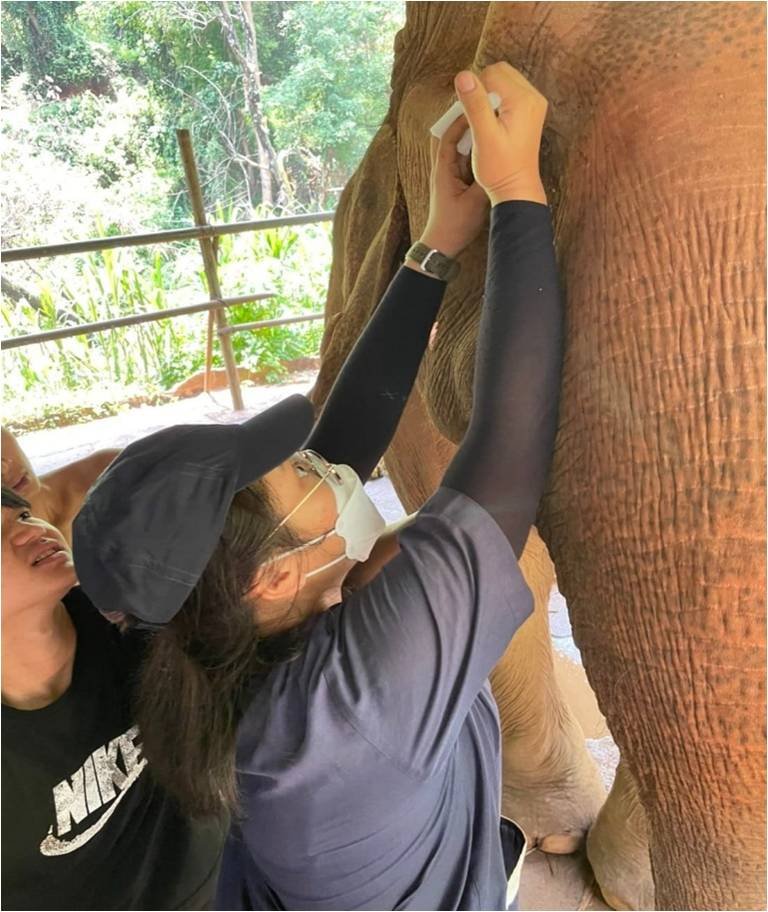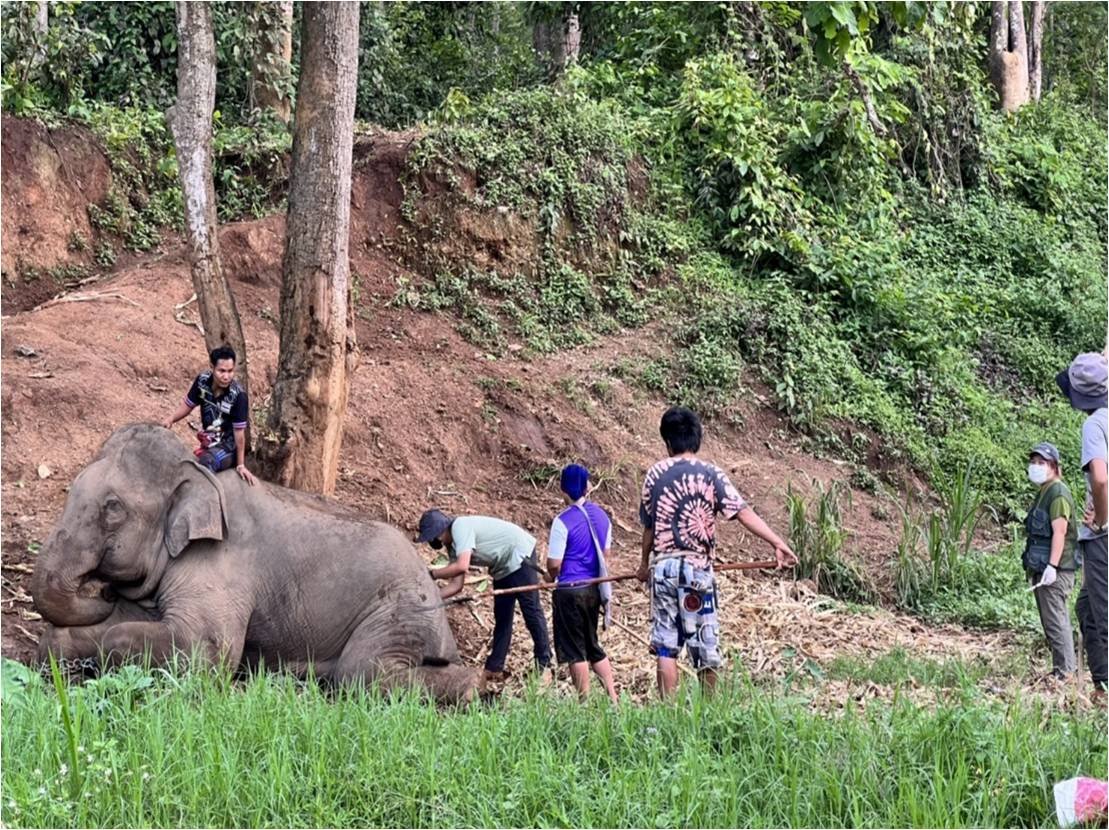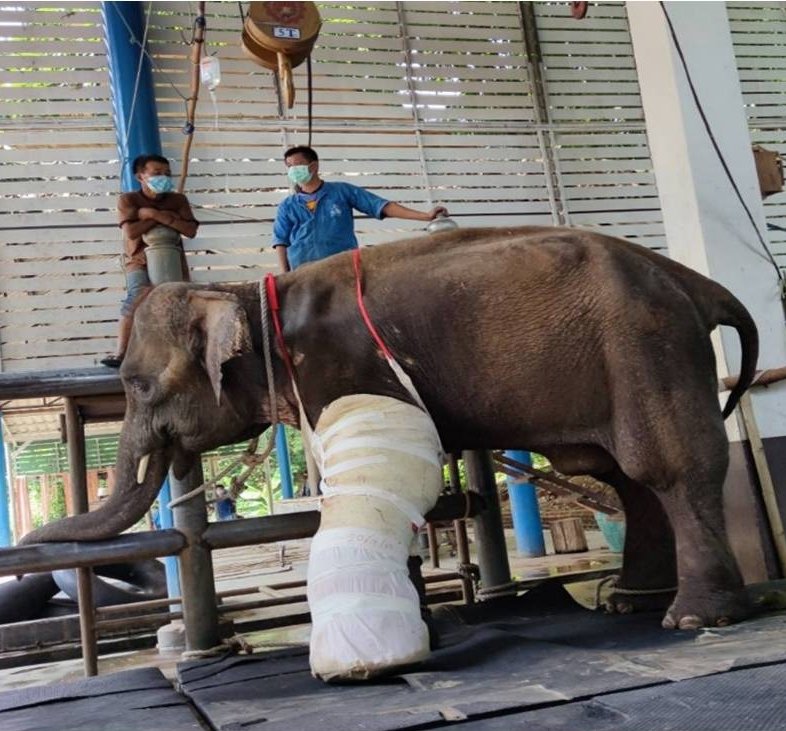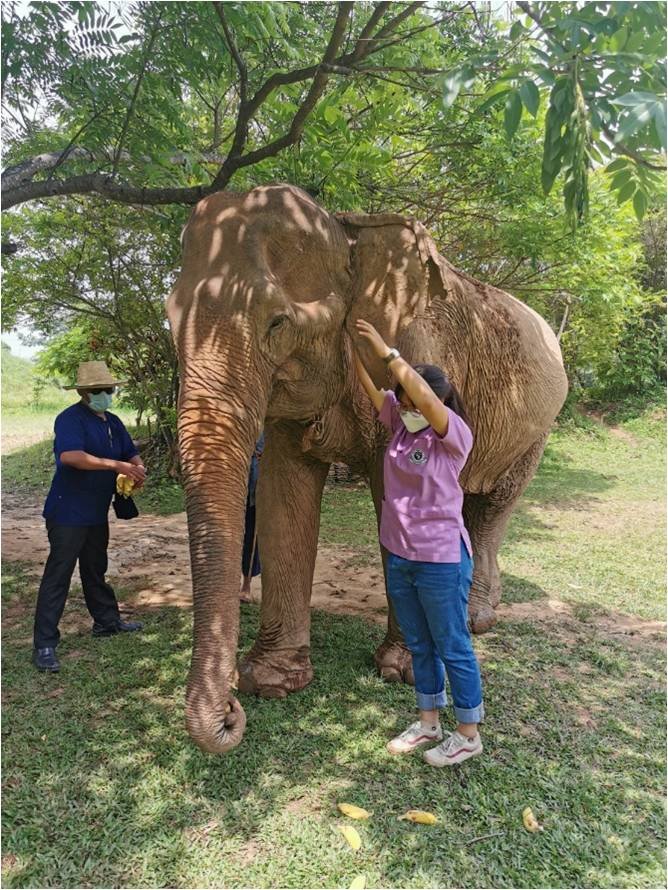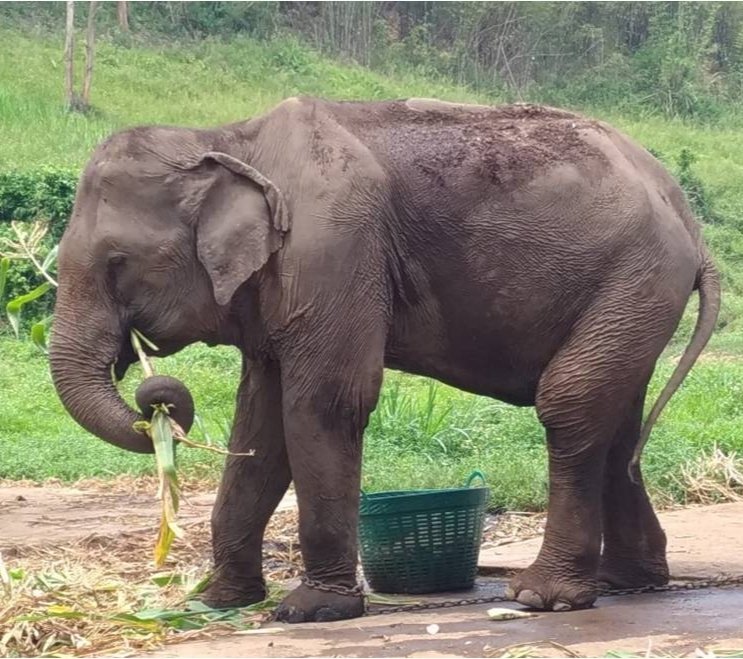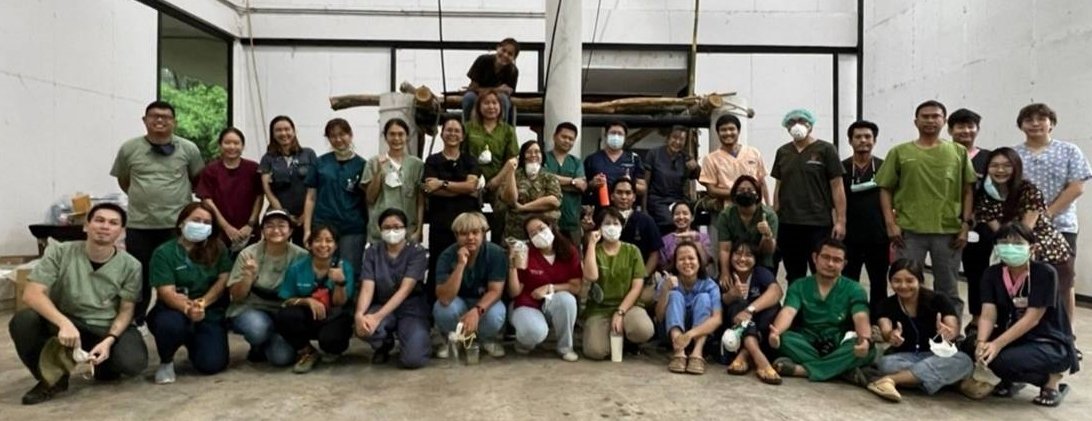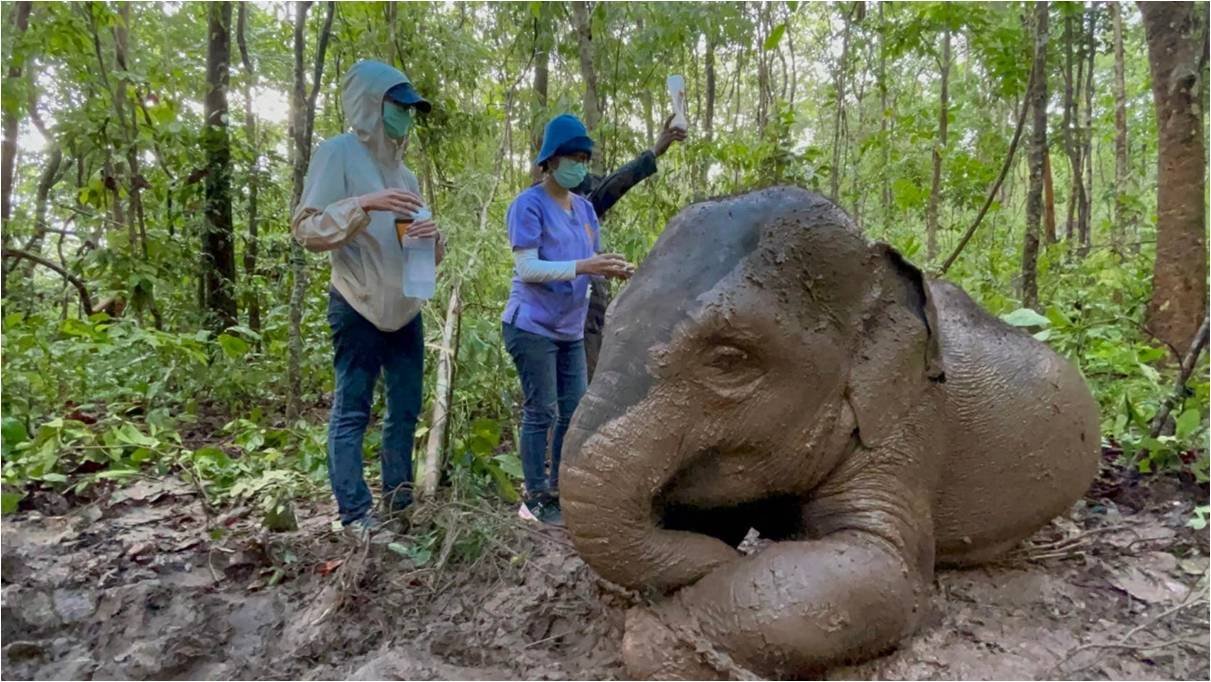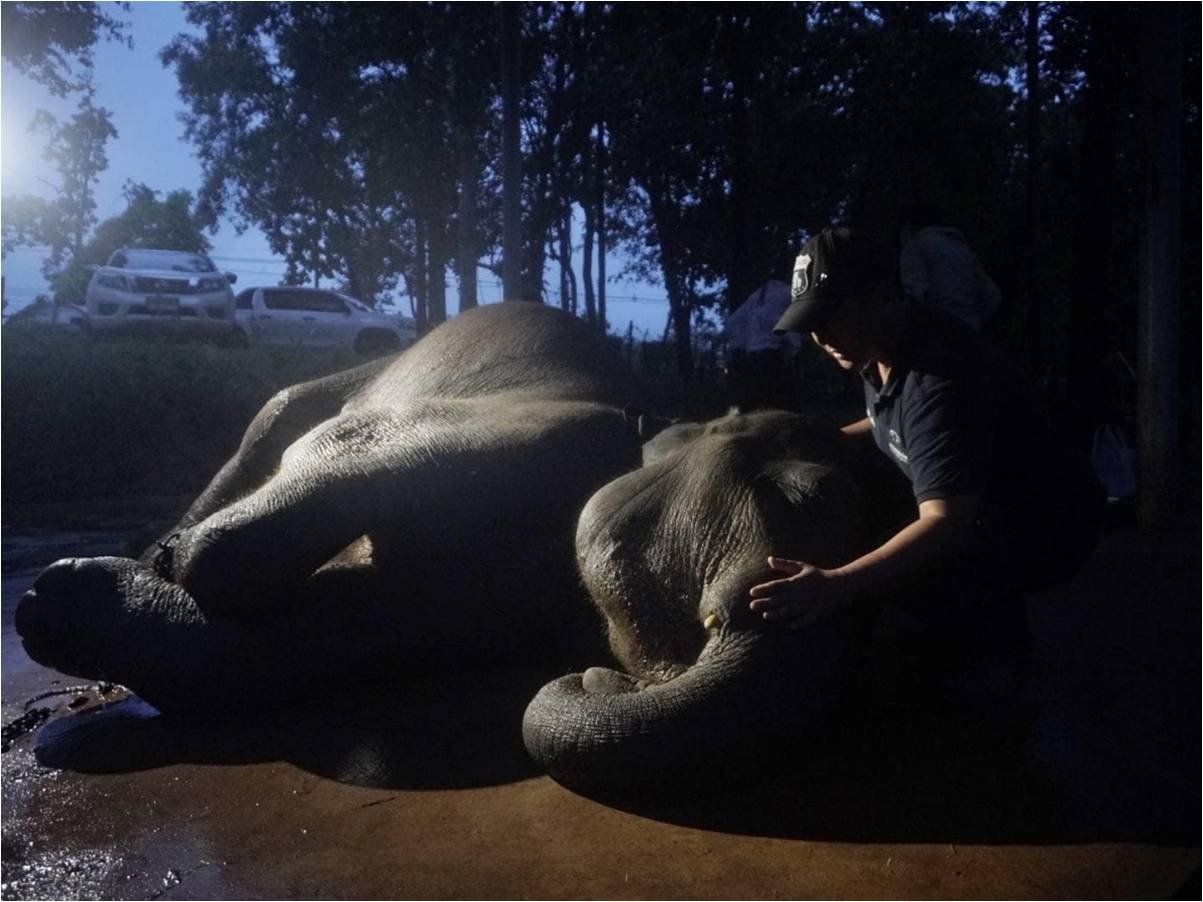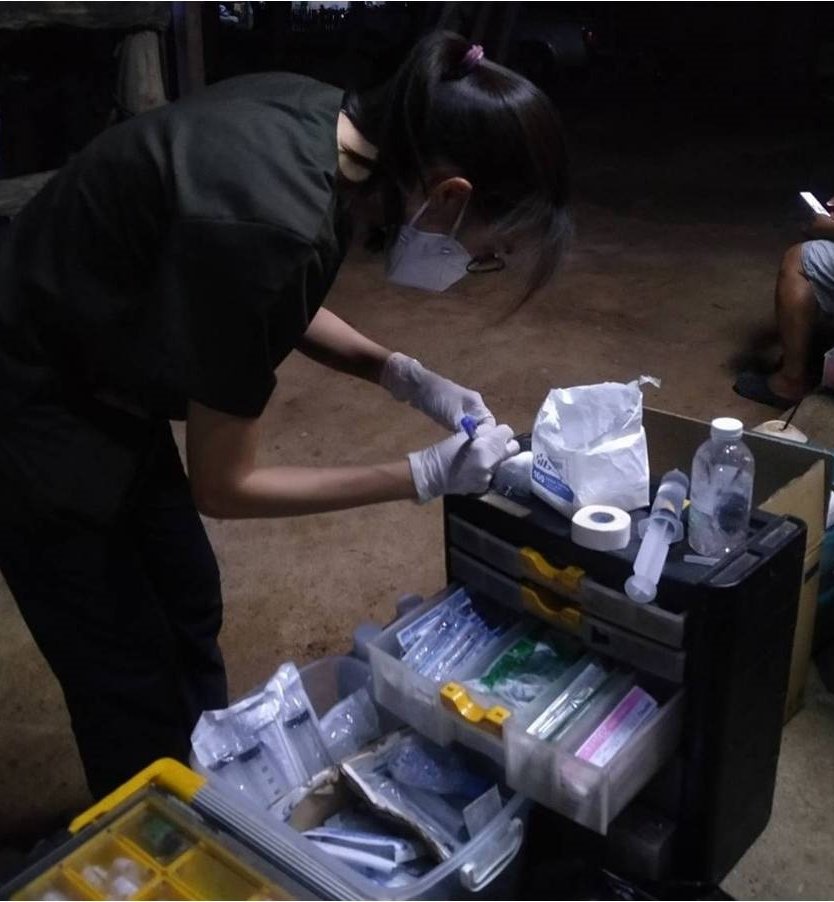This AES newsletter contains not one, but two months of updates from the reports provided to us by Dr. Siripat of the Chiang Mai University Mobile Vet Clinic. We hope you enjoy and appreciate all the hard work being done for elephants!
The month of April for the CMU Team was, again, quite busy providing health care to Thailand’s elephants. On April 8, the Mobile Vet Clinic visited a camp in Mae Wang district to do a hormone check on an elephant to determine if she was ready for breeding. At the same time, they were also asked to check another elephant’s eye, which had been quite teary. Upon examination, the elephant’s eye most likely was affected by the wind and dust that had been blowing during the elephant’s transport earlier that day. There was a corneal ulcer, so the Team supplied eye medicine for the owners to use to help the eye heal.
Also in the Mae Wang district, the CMU Team worked together with the Thai Elephant Alliance Association (TEAA) to control a bull in musth who had wandered into a tourist area.
You may remember that the two teams successfully worked together in a similar situation in March. After five hours of work, the teams safely anesthetized and controlled the bull. No humans or elephants were injured in this instance, thankfully.
However in April, the CMU Team, in collaboration with the Thai Elephant Conservation Center (TECC) was still caring for an elephant who had been previously injured by the musth bull we reported on last month. On April 22, the Mobile Vet Clinic headed to the TECC Elephant Hospital to change a cast on the female elephant with the broken femur in her front left leg. She had been wearing the cast for almost a month and the veterinary teams performed general anesthesia in order to completely change the cast, which runs all the way up to the elephant’s armpit. After wearing the cast for a month, it had become dirty and damp. The splint that was also placed inside the previous cast had created minor abrasions. Those abrasions were treated and a new clean cast was put on.
On April 24, the CMU Team traveled to the Mae Rim district where there was a report of a suspected snake bite. There had been King cobra sightings in the area recently. The owner decided to keep the elephant at the camp, after being advised to take the elephant to the elephant hospital immediately, since snake bites can be deadly. After examination however, the elephant looked healthy, and all the vital signs were in normal range.
April 28 saw the Mobile Vet Clinic heading to Mae Tang to treat one elephant with an eye issue and another elephant suffering from arthritis. After examining the elephant with frothy tears coming from her eye, it was determined that there was a wound on the lens of her eye, and the cornea was a little cloudy. The Team took the opportunity to teach the mahout how to clean her eyes and administer the eye medication. They also gave the elephant some anti-inflammatory medications. Then a mahout reported that he had an elephant suffering from arthritis. She seemed weak in both hind legs and she hadn’t laid down in a week.
The CMU Team was quite worried about this elephant, in case she fell over and couldn’t get up. The team observed how the elephant walked, did some exercising and used thermal imaging to get a better understanding of the elephant’s condition. There was inflammation found in both hind legs, especially the right hind leg. The doctor administered some anti-inflammatory medications and some leg massage oil. They also educated the mahout on taking care of aging elephants by supplementing calcium rich foods and making sure they have adequate bedding.
May also saw the Veterinary Team from CMU Mobile Vet Clinic managing a wide-variety of cases, participating in caring for elephants with a number of other organizations as well as working towards a better understanding of elephant disease.
Along with staff from the TECC, the Team from Chiang Mai University participated in a workshop focused on “Respiratory Disease Surveillance in Elephants”. In addition to lectures, the workshop included hands-on experiences, working with elephants at the TECC Elephant Hospital.
The CMU Team also worked alongside the TEAAagain when the Chiang Mai Department of Livestock Defense (DLD) requested assistance in performing health checks for elephants and distributing supplies to mahouts and caretakers in the province.
As the rainy season begins in Thailand, extra precautions need to be taken to prevent illness in elephants, especially younger ones. So the Mobile Vet Clinic went to the Mae Wang area to conduct general health exams and provide vitamin C to help support immune systems as well as provide advice to mahouts regarding proper management and being aware of potential health issues.
Additional cases during the month of May included treating an elephant with colic, or gastrointestinal distress, with fluids and an enema as well as responding to an emergency call where an elephant was bleeding profusely. With the help of the TEAA the CMU Team transported an elderly elephant who was experiencing severe pain in a hind limb to the TECC Elephant Hospitaland treated another elephant that had been bitten on her abdomen by insects and was suffering an allergic reaction.
Elephant with colic provided fluids and an enema to help pass rough feces successfully
On May 21 a concerning report came in about a six-year-old calf that had fallen off a waterfall in the Mae Wang area. Once again the Team from the CMU Mobile Vet Clinic sprung into action and with the help of many people including other mahouts, rescue units, Livestock and other Officers from neighboring districts, they worked to save the calf.
The CMU Team with others from TEAA provided the initial care for the calf after moving it to safety. Ultimately the calf had to be relocated again to the Bodo Elephant Camp for further care and monitoring. We hope to provide an update on this little one in future newsletters.
Calf resting following care received after falling from a waterfall
Sadly, news came in at the very beginning of June that the elephant we have been following for the last two months who required her leg to be casted, passed away. She had been injured by a bull in musth that had been rampaging, uncontrolled, through a village and she was sent for further care at the TECC Elephant Hospital back in March. After truly heroic efforts on the part of all the Veterinary Teams involved in her care, she began to develop an infection at the original wound site and additional issues from bearing weight on her other limbs. We know so many invested an incredible amount of time and energy to try to save her and everyone had hoped for a better outcome. May she rest in peace and may our partners know how much we appreciate their efforts to save her.
As they continue their medical care to Thailand’s elephants in need, more often with great success and at times, despite all efforts, with devastating endings, you can continue to support the work of the CMU Mobile Vet Clinic by visiting our website and making a donation through Asian Elephant Support. The need for this Team does not stop and your contributions are critical to their ability to respond to all calls for assistance.

